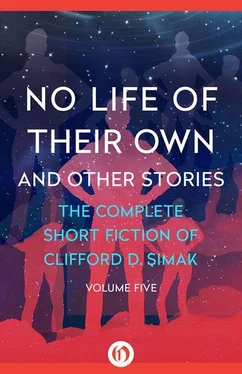Scott looked down at the man at his feet.
Harry Decker and Jimmy Baldwin and now Hugh Nixon. Three men had died here on Mars. He was the only one left. And he probably would die, too, for no man could for long breathe that Martian air and live.
What was it Hugh had said that first day?
“It plays hell with the tissues of your lungs.”
He stared around him, saw the interminable red deserts and the scarlet patches of Martian lilies, nodding in the breeze. Saw the humming bugs flashing in the pale sunlight. Saw the shimmer of the mighty building that had no doors or windows.
His lungs were aching now and his throat was raw. It was harder and harder to breathe.
He knelt in the sand and lifted the blackened body. Cradling it in his arms, he staggered along.
“I have to make another cross,” he said.
Far overhead, in the depths of space, twinkled the blue planet whose life would never know the slavery of the emotionless race of a dying world.
Even the title of this story speaks a little of the way Clifford D. Simak wrote: he took an old country institution and used it for a story about an ultra-futuristic idea. “Party Line” was originally published in the November/December 1978 issue of Destinies —the very first issue of the paperback-size magazine experiment by Baen Books. And it features a theme Cliff utilized more and more frequently in the latter part of his career: how members of a disparate group talk among themselves a lot, conversing and learning from, and with, one another. I wonder whether that might not have been Cliff’s idea of heaven?
—dww
I
Einstein did not come in. That was unusual. Very seldom was Einstein late or absent. Usually he was waiting, ready to take up again the patient teaching that had been going on for months.
Jay Martin tried again.
—Einstein. Einstein. Are you there?
Einstein was not there.
The console in front of Martin hummed and the sensor lights were flickering. The cubicle was quiet, an engineered quietness, insulated against all distraction. Martin reached up and adjusted the helmet more firmly on his head.
—Einstein. Einstein. Where are you?
A faint sense of beginning panic flicked across Martin’s mind. Had Einstein finally given it all up as a bad job? Had he (or she, or it, or them?) simply slipped away, dropping him, finally despairing of making so ignorant a student understand what he had to say?
Something out there stirred, a thin whistle of distant emptiness. Strange, thought Martin, how it always came that way—the haunting sense of distant emptiness. When there was, in fact, no distance nor no emptiness involved. The carrier waves were immune to any of the limitations of the electromagnetic spectrum. Instantaneous, no lag, as if distance, matter, time did not exist.
—Einstein? he asked, convinced that it wasn’t Einstein. It didn’t feel like Einstein, although he would have been hard pressed if he had been called upon to tell how Einstein felt.
The thin whistle came again.
—Yes, said Martin, I’m here. Who are you?
And the voice (the thought? the pulse? the intelligence?) spoke.
—The turning point, it said.
—Unclear, said Martin. What turning point?
—The universe. The universe has reached its turning point. Universal death has started. The universe has reached its farthest point. It now is running down. Entropy has been accomplished.
—That, said Martin, is a strange way to say it.
—The universe always strove toward entropy.
—Not here, said Martin. No entropy here. The stars still burn.
—At the edge. The outer fringe. The universe at the edge has reached the point of entropy. Heat death. No more energy. And now is falling back. It is retreating.
The distance whistled. The emptiness keened.
—You are at the edge?
—Near the rim. That is how we know. Our measurement …
The distance howled, drowning out the words.
—How long? asked Martin. How long till the end?
—Equal to the time since the beginning. Our calculations—
—Fifteen billion years, said Martin.
—We do not grasp your measurement.
—Never mind, said Martin. It makes no difference. I should not have said it.
—The pity of it! The irony!
—What pity? What irony?
—We have tried so long. Everyone has tried so long. To understand the universe and now we have no time.
—We have lots of time. Another fifteen billion years.
—You may have. We haven’t. We’re too close to the rim. We are in the dying zone.
A cry for help, thought Martin. The moaning of self pity. And was shaken. For there’d never been a cry for help before.
The other caught his thought.
—No cry for help, it said. There is no help. This is warning only.
The pulse, the thought cut off. Distance and emptiness whistled for a moment and then it, too, cut off.
Martin sat huddled in his cubicle, the weight of all that distance, all that emptiness crashing down upon him.
2
The day began badly for Paul Thomas.
The desk communicator chirped at him.
“Yes,” he said.
His secretary’s voice said, “Mr. Russell is here to see you.”
Thomas grimaced. “Show him in,” he said.
Russell was prissy and precise. He came into the office and sat down in a chair across the desk from Thomas.
“What can I do for R&D this morning?” Thomas asked, ignoring all conversational preliminaries. Russell was a man who was impatient with social amenities.
“A lot more than you’re doing,” Russell said. “Goddammit, Paul, I know that you are hip-deep in data. It’s piling up on you. We haven’t had a thing from you in the last six months. I know the rules, of course, but aren’t you giving them too strict an interpretation?”
“What are you interested in?”
“The faster-than-light business for one thing. I happen to know that Martin … “
“Martin still is working on it.”
“He must have something. Besides being a good telepath, he also happens to be a top-notch astrophysicist.”
“That’s true,” said Thomas. “We don’t often get a man like him. Mostly, it’s a raw farm boy or some girl who is clerking in the five-and-dime. We’re running recruiting programs all the time, but …”
“You’re trying to throw me off the track, Paul. I’ve got men aching to get started on this FTL thing. We know you’re getting something.”
“The funny thing about it is that we aren’t.”
“Martin’s been on it for months.”
“Yeah, for months. And not understanding anything he’s getting. Both he and I are beginning to believe we may have the wrong man on it.”
“The wrong man on it? An astrophysicist?”
“Ben, it may not be physics at all.”
“But he has equations.”
“Equations, yes. But they make no sense. Equations aren’t the magic thing all by themselves that people think they are. They have to make some sense and these make no sense. Jay is beginning to think they’re something entirely outside the field of physics.”
“Outside the field of physics? What else could they be?”
“That’s the question, Ben. You and I have been over this, again and again. You don’t seem to understand. Or refuse to understand. Or are too pig-headed to allow yourself to understand. We aren’t dealing with humans out there. I understand that and my people understand it. But you refuse to accept it. You think of those other people out there among the stars as simply funny-looking humans. I don’t know, no one knows, what they really are. But we know they aren’t humans, not even funny-looking humans. We wear ourselves out at times trying to work out what they are. Not because of any great curiosity on our part, but because we could work with them better if we knew. And we have no idea. You hear me? No idea whatsoever. Hal Rawlins is talking to someone he is convinced is a robot—a funny-looking robot, of course—but he can’t even be sure of that. No one can be sure of anything at all. The point is that we don’t really have to be. They accept us, we accept them. They are patient with us and we with them. They may be more patient than we are, for they know we are newcomers, new subscribers on this party line we share. None of them think like us, none of us think like them. We try to adapt ourselves to their way of thinking, they try to adapt themselves to our way of thinking. All we know for sure is that they are intelligences, all they know is that we are some outrageous kind of intelligent life form. We are, all of us, a brotherhood of intelligences, getting along the best we can, talking, gossiping, teaching, learning, trading information, laying out ideas.”
Читать дальше












